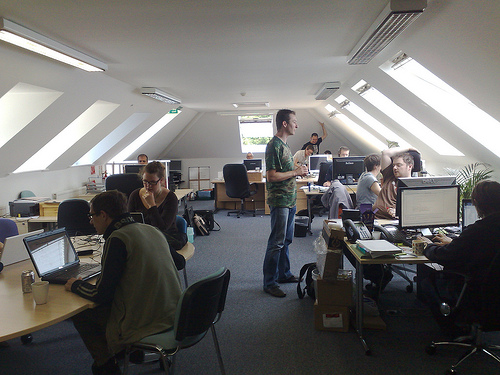From a young age all the way up through college I was completely addicted to snowboarding. Every day I was not snowboarding felt like the world was coming to an end. I used to be on the first and last lift ride up for the day. I was competing. I was talking to possible sponsors. I was working for the mountain as a snowboard instructor. Sadly, in recent years that drive and passion for the sport have gone away. I visit the mountain less each year. I spend less time at the mountain when I do go.
Today I was reflecting on why I lost the passion. I have become complacent in my snowboarding. I have peaked. I don’t see myself landing more complex tricks as life goes on. I am just going to the mountain to enjoy a nice day. I do not have any goals such as to learn a new trick. There is not something new and exciting for me to conquer. I feel I have mastered snowboarding as much as I ever will.
Clearly, the period in my life where I really wanted to grow and progress in snowboarding is past me. This is ok. I will find new challenges in life.
There is, however, some drawback to losing my passion for snowboarding. I don’t think I will be winning any future competitions. I don’t think sponsors will be knocking on my door. I don’t think mountains will be fighting to hire me. As I am no longer bringing passion and excitement to the table my “return on investment” as a snowboarder has declined. Simply put, my snowboarding career is a declining asset.
The same relationships apply to hiring software engineers. I want to hire a programmer while they are still in the growth period of their career. I want engineers that feel every second they are not programming is a wasted movement. I want to hire engineers that are always challenging themselves to learn something new. After an engineer peaks they are a declining asset; they lose the passion. They stop spending the weekend keeping up on the latest technologies. They stop looking for new and exciting ways to solve problems; they stick to what they know. When the passion and excitement wear off, the employer’s return on investment decreases.
I am not suggesting that every engineer peaks. I think more times than not engineers lose the passion. Everyone is different. Some peak early and some peak later, some don’t peak at all.
Also, I am not suggesting we fire every employee that has already peaked. I’d rather work with a good employee to give them new challenges and to find areas they have not yet mastered, but for which they can use the expertise from the previous years, such as managing a team of programmers. I am, however, suggesting that, when hiring, years of experience can sometimes be a bad thing, even though not always.
To find engineers who will grow with the company, what I look for when I hire is engineers that consider programming a way of life not just a job - just like snowboarding was a way of life for me.
Read More...
Last week I made a comment on twitter about how I did not want to hire a candidate without previously have a Github account. I got some backlash more or less calling me a fan boy of Github. While I am a fan boy of Github, that was not the reasoning behind my comment.

If you have ever read a programmer’s resume you know it is a big listing of every programing language they have ever looked at. All languages are the same right? Once you know one you know them all right? I call bullshit on this. Yes, once you know some CS fundamentals jumping into a new language is easier. You do not need to go back to college or anything. You can generally figure it out - but you cannot figure it out overnight. Just because you are considered a senior programmer in one language it does not make you a senior programmer in another language. As a small business we can not afford to hire someone that is going to need ramping up time. We need someone that can hit the ground running. We need someone that is going to produce high quality code, quickly.
So when looking at some one’s Github account I can quickly see what language makes them high. I can see what technologies they pursue in their own time. You don’t publish code on Github unless you are at least somewhat proud of it. Going to anyone’s Github account shows you within seconds what language is their primary focus. I am only interested in hiring people that share the same primary focuses we have. When hiring I want the best of the best in the field we are looking for, not someone who can “learn to be the best” or who is the best at something else.

Lastly, the technologies we use have all made Github their official home. The leaders and maintainers building these technologies have made Github their official hangout. If you are not part of this community it is a good indication to me that you are not truly passionate about your programming craft, (or at least the craft we are looking for). If you are truly passionate about skiing you do not live in Florida do you?
Generally, I want to hire people who have a natural fascination with the technologies we use. In programming passion and fascination are much bigger motivators than a paycheck. Not having a Github account in my world says to me you are just looking for a paycheck.
Read More...
 One of the biggest challenges of working with remote/virtual workers is communication. Email tends to be the go-to way to communicate, but is it the most effective way? Usually not.
One of the biggest challenges of working with remote/virtual workers is communication. Email tends to be the go-to way to communicate, but is it the most effective way? Usually not.
One of the best things you can do to improve your business communications is before you send an email, take a few minutes to think about what the best method of communication is.
IM
Instant Messaging is perfect for two different types of communication-quick things where you need a one line response or collaborative tasks that are easier to accomplish in real time.
If all you need from Bob is a quick, one-line response, and you need it NOW, then IM is your best course of action. It’s simple, it’s fast, and it’s immediate-you don’t have to wait for Bob to check his email, then get back to you.
On the opposite side of the coin, sometimes IM is best for longer, real-time sessions, such as a brainstorming session. In this case, don’t interrupt Bob-set up an appointment, and then come appointment time, hop on your IM client of choice and get brainstorming. Also, most IM clients let you save a transcript, so you can also refer back to the conversation if need be.
Micro-Blogs
Sometimes you want to throw out a new idea or give a general status update to everyone. If you’re company is using a Micro-Blog, type app such as Flowr or Yammer, this is perfect for that. It allows everyone to view the idea or status update and comment on it in their own time, along with seeing what everyone else contributed.
Project Management Apps
Many project management apps offer you the ability to post a status update or comment on a task. If you are assigning a task or have a question about a task that was assigned to you, and are using a project management app-this is the most efficient way to go.
Document Collaboration
When it comes to real-time document collaboration, Google Docs is where it’s at. You can have multiple log-in and work on the document at once, see where each person is working in a document, and even IM each other in a side-panel, perfect for discussing ideas, content, and editing.
Intranet Sites
For frequently repeated information or documenting procedures so team members can refer back to and reference the, you can’t go wrong with an intranet site. If you’re using Google Apps for business, you can easily create an intranet site using Google Sites. Or you could use something like PBWiki or SocialText. The main thing is creating a place to house and document procedures to eliminate repetitive questions.
How do you handle communication with virtual team members? Do you use any of the above?
Read More...
 As more and more people are working remotely, co-working and co-working spaces are becoming more and more popular. Today we’re going to take a closer look at exactly what co-working is, how to find co-working spaces, and how to decide if it’s for you.
As more and more people are working remotely, co-working and co-working spaces are becoming more and more popular. Today we’re going to take a closer look at exactly what co-working is, how to find co-working spaces, and how to decide if it’s for you.
What Exactly IS Co-Working?
Co-working in a nutshell is a shared workspace where everyone pays a fee to help cover overall costs. In turn, the workspace offers desks, an internet connection, and usually things like a printer and fax machine. People can “rent” a desk, at the workspace, see and meet other new people, and have a different 4 walls than the one’s their used to. It offers more privacy and quiet than a coffee shop, but less than a private office. In turn, it’s more expensive than a coffee shop, but much cheaper than a private office.
How to Find Co-Working Spaces
You can always try Google, but there are a few different places that make it a bit easier to find a co-working space.
The Co-Working Wiki
The Co-Working Wiki is your one-stop shop for all information related to co-working, including a directory of co-working spaces across the world. In addition to the directory, they have information on co-working for all levels-whether you’re just investigating, have co-worked before, or are interested in starting your own co-working space. It also includes a information on how to get involved, media coverage of co-working, and links to other resources. Definitely start here.
DeskWanted
DeskWanted allows you to search for co-working spaces both by location and lease terms, such as Daily, Monthly, Quarterly, or Yearly. It list spaces from all over the world, but has more of a focus on Europe.
Loosecubes
Similar to DeskWanted, Loosecubes allows you to search for co-working spaces by location and minimum stay. One of the nice things about Loosecubes is it lets you find and reserve desks for as little as one day-and you can make the reservation straight through Loosecubes. Loosecubes also lists spaces from all over the world, but has more of a focus on the United States.
Is It For You?
Well, if never hurts to try. And some co-working spaces let you rent for the day, so you can test it out and see how you like it.
However, if you’re on the fence about trying and any of the below statements ring true, it might be worthwhile to look into:
While you enjoy working remotely-and/or working for yourself-you find yourself lonely and missing co-workers.
You find yourself easily distracted at home and miss having a designated workplace.
You have a hard time separating work-time and home-time. Leaving and going to an office space might help you distinguish and create work-boundaries.
Although you prefer to work from home regularly, you think it might be nice to get out and try something new.
Have you tried co-working before? What did you think of it? Is it something you’d do again?
Read More...
 As a 4th generation entrepreneur, and as someone who grew up in a small town, being a business owner has a very different meaning to me than to someone from the silicon valley. I grew up watching my father and grandfather build businesses on their own with nothing more than an idea, willingness to take risk, and maybe some capital from savings. Half my friends had parents who ran some sort of small business in the community. None of these companies had investors, none of these companies had boards of directors, and none of these companies were being built to be sold. Many of these companies had revenues in the millions even. Many of these business owners did end up selling their companies, but as a form of retirement.
As a 4th generation entrepreneur, and as someone who grew up in a small town, being a business owner has a very different meaning to me than to someone from the silicon valley. I grew up watching my father and grandfather build businesses on their own with nothing more than an idea, willingness to take risk, and maybe some capital from savings. Half my friends had parents who ran some sort of small business in the community. None of these companies had investors, none of these companies had boards of directors, and none of these companies were being built to be sold. Many of these companies had revenues in the millions even. Many of these business owners did end up selling their companies, but as a form of retirement.
Maybe I am jaded because I am in the Internet business, but I talk to future entrepreneurs every day - people with dreams and plans of running their own business. I have been talking to such people for over a decade now. More and more I am hearing from people not thinking about starting businesses the traditional way for traditional reasons. Everyone wants to start an Internet company. It makes me wonder: is the small town entrepreneur dead? Are we entering into a period when the market is no longer the small town, but the world? Are we entering into a period when hard work and a little savings are not enough to start a company and be one’s own boss?
Don’t get me wrong. There is nothing wrong with building a web business. Heck, I am no one to criticize since I have founded several Internet companies (as well as several small town businesses). We hear all the time that most start-ups fail. I think people need to be clearer about what it means to affirm that “most web start-ups fail”. I think the chances of success, defined by not having to close down your business in the future, are much greater in the traditional model described above. I am rather sure the number of failed Internet start-ups is higher than the number of failed traditional businesses.
All this begs the question; In a world where more and more future entrepreneurs are turning to the web is the entrepreneurial spirit going to decrease because the success rates are much lower?
Read More...
 Job hunting? I’ve been there. Less than a year ago, I applied to more jobs than I can remember and went on five interviews before I landed a new position. It was a learning experience, or so I thought. Recently, I found myself on the other side of the table as a member of a hiring committee. This time, I was the one sifting through scores of letters and resumes, evaluating qualifications and conducting interviews. And every time I shook my head at a novel-length cover letter or a resume that looked like it belonged to a 16-year-old, I realized I was learning much more about job hunting than ever before. Here, then, are some tips from someone who’s been there. But this isn’t a how-to for applicants; it’s a how NOT to.
Job hunting? I’ve been there. Less than a year ago, I applied to more jobs than I can remember and went on five interviews before I landed a new position. It was a learning experience, or so I thought. Recently, I found myself on the other side of the table as a member of a hiring committee. This time, I was the one sifting through scores of letters and resumes, evaluating qualifications and conducting interviews. And every time I shook my head at a novel-length cover letter or a resume that looked like it belonged to a 16-year-old, I realized I was learning much more about job hunting than ever before. Here, then, are some tips from someone who’s been there. But this isn’t a how-to for applicants; it’s a how NOT to.
DO NOT:
Cover letter
- Use a generic opening. There are only so many times – maybe twice – I could read “I would be a good fit for this position because…” before my eyes glazed over. Obviously you need to explain why you’re the perfect candidate, but you don’t need to bore people to death doing it. Make the reader want to meet (read: interview) you. (Aside: I went with unusual openings when I was a job seeker, and I’d like to think the tactic helped me land those five interviews.)
- Define the company. The person hiring you already knows what the organization does, what its mission statement is and whom it serves. Proving you can look up a website will not give you an edge.
- Re-write your resume. The cover letter and resume are different for a reason; one shouldn’t be a re-worded version of the other. Use the cover letter to detail your most relevant work experience, or share something that isn’t in your resume. It’s where you should explain any questions your resume might bring up: Gaps in employment, lots of jobs in a short period of time, little relevant experience.
- Get too wordy. One page is fine.
- Make typos, use incorrect grammar or spell things wrong. Yeah, you already knew this, but apparently some of you think you’re (not “your”) much better editors than you are. This is the time to swallow your pride and ask a perfectionist friend (or two) to check things over for you. Trust me, it’s worth it.
-
Resume
- List an objective. Really, who cares? We know your main objective: To get this job.
- Use personal testimonies. I can hardly believe this needs to be said, but I honestly saw a resume that had quotes from friends and co-workers about how wonderful an applicant was. It was unnecessary (that’s what references are for) and just plain weird.
- Talk about irrelevant experience. You have CPR certification? Great! But if you’re applying for an upper-level marketing position, it’s not a benefit and looks like you might have applied for the wrong job.
- Go too long. That’s not to say you have to keep it to one page, as has been the rule. Unless a length is specified, no one is going to throw out your application because your resume goes on to a second page. However, it shouldn’t go too much past a second page. Say what needs to be said.
Interview
- Be vague. When asked about your experience, bring up specific projects. Talk about what you actually did and what tools you used to do it.
- Get off topic. If the question is long or complicated, feel free to ask the interviewer to repeat it. Write it down if necessary. Generally, it’s a good thing if the person interviewing you is writing notes as you answer. If she’s chewing the end of her pencil and staring vacantly at the clock, wrap it up. Fast.
- Act cool. You want the job, right? Be enthusiastic. Don’t worry about seeming desperate. I’d rather hire someone who seemed desperate for a job than someone who seemed like he didn’t need it.
There you have it: Everything not to do if you want to land that job. I can’t promise these tips will get you hired – if I could, I would be in the Bahamas on my yacht right now – but I can promise they’ll keep your application from being immediately sent to the shredder.
Read More...


 One of the biggest challenges of working with remote/virtual workers is communication. Email tends to be the go-to way to communicate, but is it the most effective way? Usually not.
One of the biggest challenges of working with remote/virtual workers is communication. Email tends to be the go-to way to communicate, but is it the most effective way? Usually not.  As more and more people are working remotely, co-working and co-working spaces are becoming more and more popular. Today we’re going to take a closer look at exactly what co-working is, how to find co-working spaces, and how to decide if it’s for you.
As more and more people are working remotely, co-working and co-working spaces are becoming more and more popular. Today we’re going to take a closer look at exactly what co-working is, how to find co-working spaces, and how to decide if it’s for you.  As a 4th generation entrepreneur, and as someone who grew up in a small town, being a business owner has a very different meaning to me than to someone from the silicon valley. I grew up watching my father and grandfather build businesses on their own with nothing more than an idea, willingness to take risk, and maybe some capital from savings. Half my friends had parents who ran some sort of small business in the community. None of these companies had investors, none of these companies had boards of directors, and none of these companies were being built to be sold. Many of these companies had revenues in the millions even. Many of these business owners did end up selling their companies, but as a form of retirement.
As a 4th generation entrepreneur, and as someone who grew up in a small town, being a business owner has a very different meaning to me than to someone from the silicon valley. I grew up watching my father and grandfather build businesses on their own with nothing more than an idea, willingness to take risk, and maybe some capital from savings. Half my friends had parents who ran some sort of small business in the community. None of these companies had investors, none of these companies had boards of directors, and none of these companies were being built to be sold. Many of these companies had revenues in the millions even. Many of these business owners did end up selling their companies, but as a form of retirement.  Job hunting? I’ve been there. Less than a year ago, I applied to more jobs than I can remember and went on five interviews before I landed a new position. It was a learning experience, or so I thought. Recently, I found myself on the other side of the table as a member of a hiring committee. This time, I was the one sifting through scores of letters and resumes, evaluating qualifications and conducting interviews. And every time I shook my head at a novel-length cover letter or a resume that looked like it belonged to a 16-year-old, I realized I was learning much more about job hunting than ever before. Here, then, are some tips from someone who’s been there. But this isn’t a how-to for applicants; it’s a how NOT to.
Job hunting? I’ve been there. Less than a year ago, I applied to more jobs than I can remember and went on five interviews before I landed a new position. It was a learning experience, or so I thought. Recently, I found myself on the other side of the table as a member of a hiring committee. This time, I was the one sifting through scores of letters and resumes, evaluating qualifications and conducting interviews. And every time I shook my head at a novel-length cover letter or a resume that looked like it belonged to a 16-year-old, I realized I was learning much more about job hunting than ever before. Here, then, are some tips from someone who’s been there. But this isn’t a how-to for applicants; it’s a how NOT to.